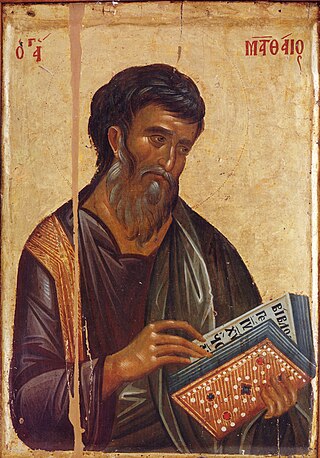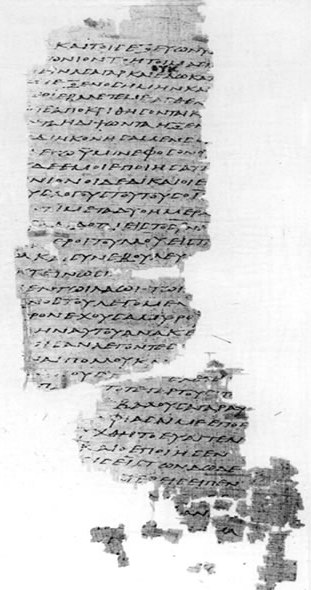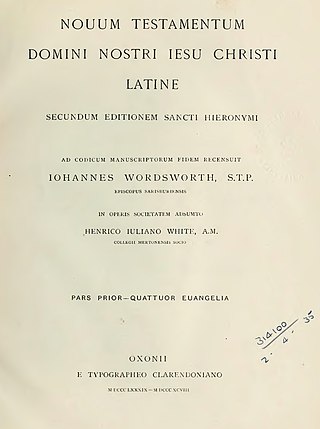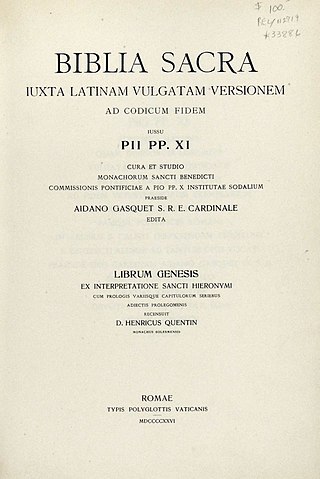Related Research Articles
The Book of Ezekiel is the third of the Latter Prophets in the Tanakh and one of the major prophetic books in the Christian Bible, where it follows Isaiah and Jeremiah. According to the book itself, it records six visions of the prophet Ezekiel, exiled in Babylon, during the 22 years from 593 to 571 BCE, although it is the product of a long and complex history and does not necessarily preserve the very words of the prophet.

Matthew the Apostle is named in the New Testament as one of the twelve apostles of Jesus. According to Christian traditions, he was also one of the four Evangelists as author of the Gospel of Matthew, and thus is also known as Matthew the Evangelist.

The Vulgate, sometimes referred to as the Latin Vulgate, is a late-4th-century Latin translation of the Bible.

In Jewish and Christian traditions, Jannes and Jambres are the names given to magicians mentioned in the Book of Exodus. This naming tradition is well-attested in ancient and medieval literature. In Latin manuscripts of the New Testament, and in Latin writing traditions, their names are known as Jamnes and Mambres.

The Book of Enoch is an ancient Hebrew apocalyptic religious text, ascribed by tradition to the patriarch Enoch who was the father of Methuselah and the great-grandfather of Noah. The Book of Enoch contains unique material on the origins of demons and Nephilim, why some angels fell from heaven, an explanation of why the Genesis flood was morally necessary, and a prophetic exposition of the thousand-year reign of the Messiah. Three books are traditionally attributed to Enoch, including the distinct works 2 Enoch and 3 Enoch. None of the three books are considered to be canonical scripture by the majority of Jewish or Christian church bodies.

The New Testament apocrypha are a number of writings by early Christians that give accounts of Jesus and his teachings, the nature of God, or the teachings of his apostles and of their lives. Some of these writings were cited as scripture by early Christians, but since the fifth century a widespread consensus has emerged limiting the New Testament to the 27 books of the modern canon. Roman Catholic, Eastern Orthodox, and Protestant churches generally do not view the New Testament apocrypha as part of the Bible.

Hexapla, also called Origenis Hexaplorum, is a critical edition of the Hebrew Bible in six versions, four of them translated into Greek, preserved only in fragments. It was an immense and complex word-for-word comparison of the original Hebrew Scriptures with the Greek Septuagint translation and with other Greek translations. The term especially and generally applies to the edition of the Old Testament compiled by the theologian and scholar Origen, sometime before AD 240.

Matthew 25, the twenty-fifth chapter of the Gospel of Matthew, continues the Olivet Discourse or "Little Apocalypse" spoken by Jesus Christ, also described as the Eschatological Discourse, which had started in chapter 24.

The Parable of the Great Banquet or the Wedding Feast or the Marriage of the King's Son is a parable told by Jesus in the New Testament, found in Matthew 22:1–14 and Luke 14:15–24.

Luke 14 is the fourteenth chapter of the Gospel of Luke in the New Testament of the Christian Bible. It records one miracle performed by Jesus Christ on a Sabbath day, followed by his teachings and parables, where he "inculcates humility ... and points out whom we should invite to our feasts, if we expect spiritual remuneration". The book containing this chapter is anonymous, but early Christian tradition uniformly affirmed that Luke the Evangelist composed this Gospel as well as the Acts of the Apostles.

Richard John Bauckham is an English Anglican scholar in theology, historical theology and New Testament studies, specialising in New Testament Christology and the Gospel of John. He is a senior scholar at Ridley Hall, Cambridge.
Discoveries in the Judaean Desert (DJD) is the official 40-volume publication that serves as the editio princeps for the Dead Sea Scrolls. It is published by Oxford University Press.
The Old Testament is the first section of the two-part Christian biblical canon; the second section is the New Testament. The Old Testament includes the books of the Hebrew Bible (Tanakh) or protocanon, and in various Christian denominations also includes deuterocanonical books. Orthodox Christians, Catholics and Protestants use different canons, which differ with respect to the texts that are included in the Old Testament.

The Jewish–Christian Gospels were gospels of a Jewish Christian character quoted by Clement of Alexandria, Origen, Eusebius, Epiphanius, Jerome and probably Didymus the Blind. All five call the gospel they know the "Gospel of the Hebrews", but most modern scholars have concluded that the five early church historians are not quoting the same work. As none of the works survive to this day attempts have been made to reconstruct them from the references in the Church Fathers. The majority of scholars believe that there existed one gospel in Aramaic/Hebrew and at least two in Greek, although a minority argue that there were only two, in Aramaic/Hebrew and in Greek.
Ezekiel the Tragedian – also known as Ezekiel the Dramatist and Ezekiel the Poet – was a Jewish dramatist who wrote in Alexandria. Naomi Yavneh has placed his work in the 3rd century BCE, while Howard Jacobson estimates the 2nd Century BCE. Evidence of the date is not definitive.

Henry Julian White was an English biblical scholar.

The Parable of the Wedding Feast is one of the parables of Jesus and appears in the New Testament in Luke 14:7–14. It directly precedes the Parable of the Great Banquet in Luke 14:15–24. In the Gospel of Matthew, the parallel passage to the Gospel of Luke's Parable of the Great Banquet is also set as a wedding feast.

The Bible translations into Latin date back to classical antiquity.

The Oxford Vulgate is a critical edition of the Vulgate version of the New Testament produced by scholars of the University of Oxford, and published progressively between 1889 and 1954 in 3 volumes.

The Benedictine Vulgate, also called Vatican Vulgate or Roman Vulgate, is a critical edition of the Vulgate version of the Old Testament, Catholic deuterocanonical books included. The edition was supported by and begun at the instigation of the Catholic Church, and was done by the Benedictine monks of the pontifical Abbey of St Jerome-in-the-City. The edition was published progressively from 1926 to 1995, in 18 volumes.
References
- ↑ R. E. Mueller and S. E. Robinson, Apocryphon of Ezekiel (First Century B.C.-First Century A.D.). A New Translation and Introduction, in James H. Charlesworth (1985), The Old Testament Pseudoepigrapha, Garden City, NY: Doubleday & Company Inc., Volume 2, ISBN 0-385-09630-5 (Vol. 1), ISBN 0-385-18813-7 (Vol. 2). Here cited vol. 1 pp. 487-488
- ↑ Cook, Stephen L.; Mueller, James R. (1996). "The Five Fragments of the Apocryphon of Ezekiel: A Critical Study". Journal of Biblical Literature. 115 (3): 532. doi:10.2307/3266910. JSTOR 3266910.
- ↑ "Apocryphon of Ezekiel". www.earlyjewishwritings.com. Retrieved 2020-04-05.
- ↑ BREGMAN, MARC (1991). "The Parable of the Lame and the Blind: Epiphanius' Quotation from an Apocryphon of Ezekiel". The Journal of Theological Studies. 42 (1): 125–138. doi:10.1093/jts/42.1.125. ISSN 0022-5185.
- ↑ BREGMAN, MARC (1991). "The Parable of the Lame and the Blind: Epiphanius' Quotation from an Apocryphon of Ezekiel". The Journal of Theological Studies. 42 (1): 125–138. doi:10.1093/jts/42.1.125. ISSN 0022-5185.
- ↑ Bauckham, Richard (2017-01-01), "Apocryphon of Ezekiel Fragment 3: Meaning and Reception", in DiTommaso, Lorenzo; Henze, Matthias; Adler, William (eds.), The Embroidered Bible: Studies in Biblical Apocrypha and Pseudepigrapha in Honour of Michael E. Stone, Brill, pp. 213–236, doi:10.1163/9789004357211_015, ISBN 978-90-04-35721-1 , retrieved 2020-05-19